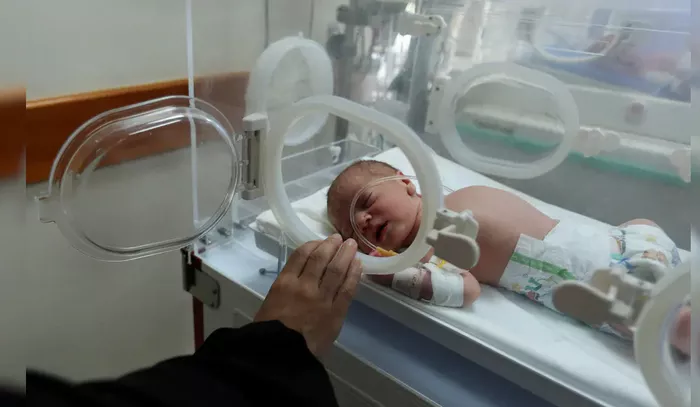An NHS trust has acknowledged serious failings in its procedures after a baby died due to contaminated feed. This admission was made during an inquest into the death of a premature infant, Aviva Otte, who passed away on January 2, 2014, at St Thomas’ Hospital in London. The situation raises grave concerns about the safety protocols in place for the preparation of parenteral nutrition for vulnerable newborns.
Investigation Highlights Unsafe System
The inquest at Southwark Coroner’s Court heard evidence from Dr. William Newsholme, a senior doctor at Guy’s and St Thomas’ NHS Foundation Trust (GSTT). He led the investigation into the outbreak of Bacillus cereus, a harmful bacteria responsible for Aviva’s death and infections in several other newborns.
During his testimony, Dr. Newsholme was questioned about the significant delay in reporting the results of tests conducted on baby feed samples taken on December 26, 2013. These results were not returned until January 6, 2014, after Aviva had already died and three other infants had fallen ill.
When asked whether he would agree that such a delay indicated an “entirely unsafe system” for preparing nutrition for the most vulnerable patients, Dr. Newsholme replied, “Yes, I would.”
Ongoing Inquest into Infant Deaths
The inquest is examining the events surrounding not only Aviva’s death but also the fatalities of two other infants, nine-day-old Yousef Al-Kharboush and one-month-old Oscar Barker, who were involved in a second outbreak of Bacillus cereus five months later. That outbreak affected 19 infants across nine hospitals, resulting in three deaths.
On January 17, 2014, Eileen Sills, GSTT’s chief nurse, expressed concerns about the delayed communication regarding the infection control department’s awareness of the outbreak. In an email directed to Amanda Pritchard, then chief operating officer of GSTT and now the CEO of NHS England, Sills questioned whether the issue should have been escalated sooner. Her inquiry focused on the period between December 24 and January 2, suggesting that a faster response could have mitigated the outbreak’s impact on the neonatal unit.
Dr. Newsholme acknowledged the appropriateness of Sills’ questions, stating, “Given the trust’s need to know about the outbreak and act to limit its impact, this is an entirely appropriate question for her to ask.”
Disclosures of Previous Outbreaks
In 2022, it was revealed by The Guardian that the initial outbreak had occurred, yet GSTT had not publicly disclosed this information. The trust faced criticism for failing to inform the public about the risk to newborns during that time.
Dr. Grenville Fox, another senior doctor at GSTT who treated Aviva, testified earlier in the month, confirming that Aviva’s death was a direct result of the contaminated feed. This statement directly contradicted the trust’s previous claims, which had maintained for over a decade that her death was due to “natural causes.”
Questions Surrounding Investigative Reports
Dr. Newsholme faced further scrutiny regarding the “root cause analysis” report from his investigation into the first outbreak. The report did not mention that one of the infected babies had died. When questioned about this significant omission, he described it as “an unfortunate omission,” without offering further clarification. The report only indicated that four patients had become ill during the outbreak, with three experiencing moderate clinical deterioration.
In addition, he was asked why GSTT had prepared a “holding statement” for journalists inquiring about the first outbreak while failing to alert the media about the outbreak of Bacillus cereus, a potentially lethal infection. Dr. Newsholme insisted that there was no intention to obscure information, stating, “This is not any form of obfuscation or cover-up.”
Two weeks prior to his testimony, another GSTT doctor, Anthony Kaiser, assured the coroner, Dr. Julian Morris, that the trust’s handling of the outbreak was “not a cover-up.”
Family’s Ongoing Struggle for Justice
The emotional toll of these events is compounded for Aviva’s mother, Jedidajah Otte, who is a journalist for The Guardian. Her personal and professional worlds have collided as she seeks accountability for her daughter’s death amid the unfolding investigation.
The inquest continues to delve into the systemic failures at GSTT, exploring how the trust allowed such a tragedy to occur. The implications of these findings could resonate beyond this case, potentially leading to changes in hospital protocols and safety measures for the care of newborns.
Conclusion
The admission by Guy’s and St Thomas’ NHS Foundation Trust regarding its unsafe practices in handling baby nutrition preparation raises alarming questions about patient safety within the healthcare system. As the inquest continues, it is clear that more scrutiny is needed to ensure that such failures do not happen again, safeguarding the lives of the most vulnerable patients—newborns.
As the investigation unfolds, the families affected seek clarity and justice, while the NHS faces renewed pressure to improve its standards and practices in infant care. The lessons learned from this tragic incident must lead to concrete changes to protect future generations of newborns in hospital settings.
Related topics:


